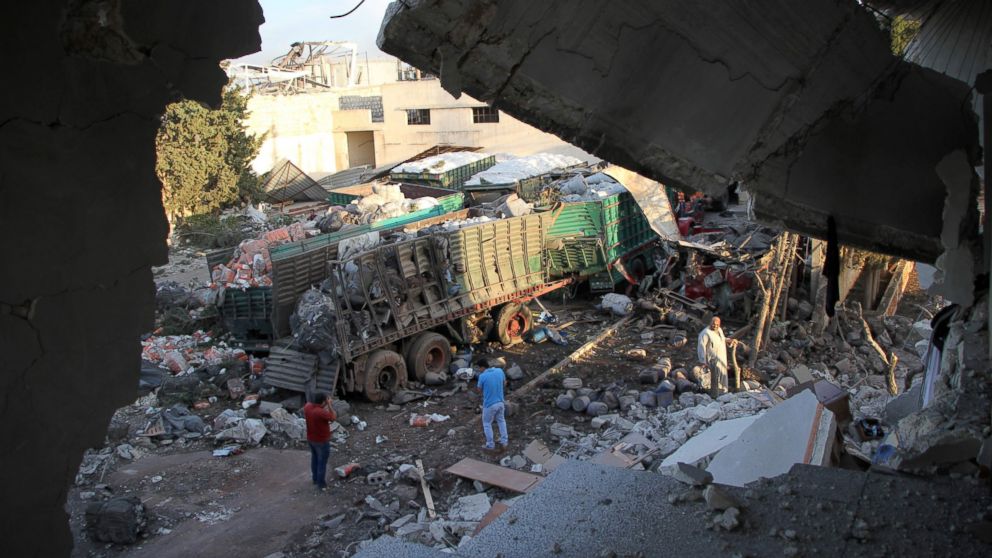Humanitarian Assistance to Syria Suspended After Attack on Aid Convoy
— LONDON -- Aid to Syria has been suspended after yesterday's attack on a United Nations and Syrian Arab Red Crescent convoy in the countryside of Aleppo.
The convoy was delivering wheat flour, health supplies and other emergency aid to some 75,000 people in Urum al-Kubra in rural Aleppo, according to the U.N. Of the 31 trucks in the convoy, at least 18 were hit. A Syrian Red Crescent warehouse was also destroyed and a health clinic severely damaged, the U.N. said. About 20 civilians and one SARC staff member were killed as they were unloading the trucks, according to a joint statement from the Syrian Arab Red Crescent, the International Committee of the Red Cross and the International Federation of Red Cross and Red Crescent Societies.
"The convoys that we had hoped to move across the border to Syria as well as aid inside Syria have been temporarily put on hold. As a result, millions of people across Syria run a very real risk of not receiving the assistance they need because of this callous attack," David Swanson, a spokesman for the U.N. Office for the Coordination of Humanitarian Affairs, told ABC News. He noted that all parties to the conflict were notified about the convoy and that it was marked with aid signs.
"Obviously, we are absolutely outraged that such an attack can take place," he said.
The U.N.'s aid coordinator said the attack on the aid convoy could amount to a war crime.
"Let me be clear: If this callous attack is found to be a deliberate targeting of humanitarians, it would amount to a war crime. I call for an immediate, impartial and independent investigation into this deadly incident," Stephen O’Brien, the U.N.'s undersecretary-general for humanitarian affairs and emergency relief coordinator, said in a statement after the attack.
The Red Crescent in Aleppo confirmed in a statement that Omar Barakat, SARC's director in Urum al-Kubra, was among those killed.
Yousef Houran, a lawyer and activist in Syria, said he witnessed aid trucks burning after the attack in Urum al-Kubra.
"Bodies of Red Crescent volunteers are still burning inside the cars and no one can get close to them because of repeated airstrikes on the same spot," he told ABC News last night following the attack.
Two U.N. trucks carrying flour and food supplies — enough to feed about 185,000 people for one month — have been parked by the Syria-Turkey border, waiting for security assurances in order to make the journey into the besieged eastern Aleppo. These trucks will remain parked until the U.N. re-evaluates the situation on the ground. Today, the four besieged towns of Madaya, Zabadani, Foua and Kefraya were supposed to receive humanitarian assistance, but the U.N. has also put these deliveries on hold indefinitely.
After the Syrian military declared the end of the U.S.-Russian-brokered truce last night, airstrikes hit several areas in Aleppo.
"We heard from a partner from Aleppo that there were 100 airstrikes in about five hours yesterday," Misty Buswell, Save the Children's regional advocacy director for the Middle East, told ABC News. "It's brutal what is going on right now and there has to be accountability for what happened last night. This is not the first time that we have seen aid being attacked in Syria. This demonstrates the new lows that this conflict has reached. We’re hearing that hospitals are overwhelmed by the number of casualties that are coming in today."
At least 38 civilians, including one child and three women, were killed by airstrikes in Aleppo and its western and eastern countryside, according to the Syrian Observatory for Human Rights. Today, airstrikes continued and the observatory said that warplanes dropped 27 barrel bombs on different neighborhoods in Aleppo city.
After an International Syria Support Group meeting today, U.S. Secretary of State John Kerry told reporters that "the cease-fire is not dead." The U.N.'s special envoy for Syria, Staffan de Mistura, echoed that statement but warned that the cease-fire is "in danger." The group is due to meet again on Friday.
The cease-fire pact focused on reducing violence in the war-torn country and delivering humanitarian aid. The agreement had to be reached before Russia and the U.S. would work together to fight militant groups ISIS and al-Nusra in Syria. After yesterday's attack on the aid convoy, the U.S. Department of State released a statement yesterday saying it would now reconsider the prospect of cooperating with Russia.
"The United States is outraged by reports that a humanitarian aid convoy was bombed near Aleppo today," the statement read. "For more than a week, we have urged Moscow to fulfill the commitments it made in Geneva to facilitate the unimpeded flow of humanitarian aid to the Syrian people. And for more than a week, the Syrian regime repeatedly denied entry to these U.N. convoys, preventing them from delivering urgent food, water and medical supplies to desperate Syrian citizens. Only today did the regime finally grant permits for some convoys to proceed. The destination of this convoy was known to the Syrian regime and the Russian federation and yet these aid workers were killed in their attempt to provide relief to the Syrian people. The United States will raise this issue directly with Russia. Given the egregious violation of the Cessation of Hostilities we will reassess the future prospects for cooperation with Russia."
Russia and the Syrian government denied that they were behind the attack on the aid convoy.
The Aleppo media center today posted photos on Twitter of the destroyed aid trucks.
Nearly 13.5 million people in Syria are in need of humanitarian assistance; an additional 4.8 million have fled their country, and 6.1 million are internally displaced, according to this month's figures from the U.N.'s Office for the Coordination of Humanitarian Affairs.




